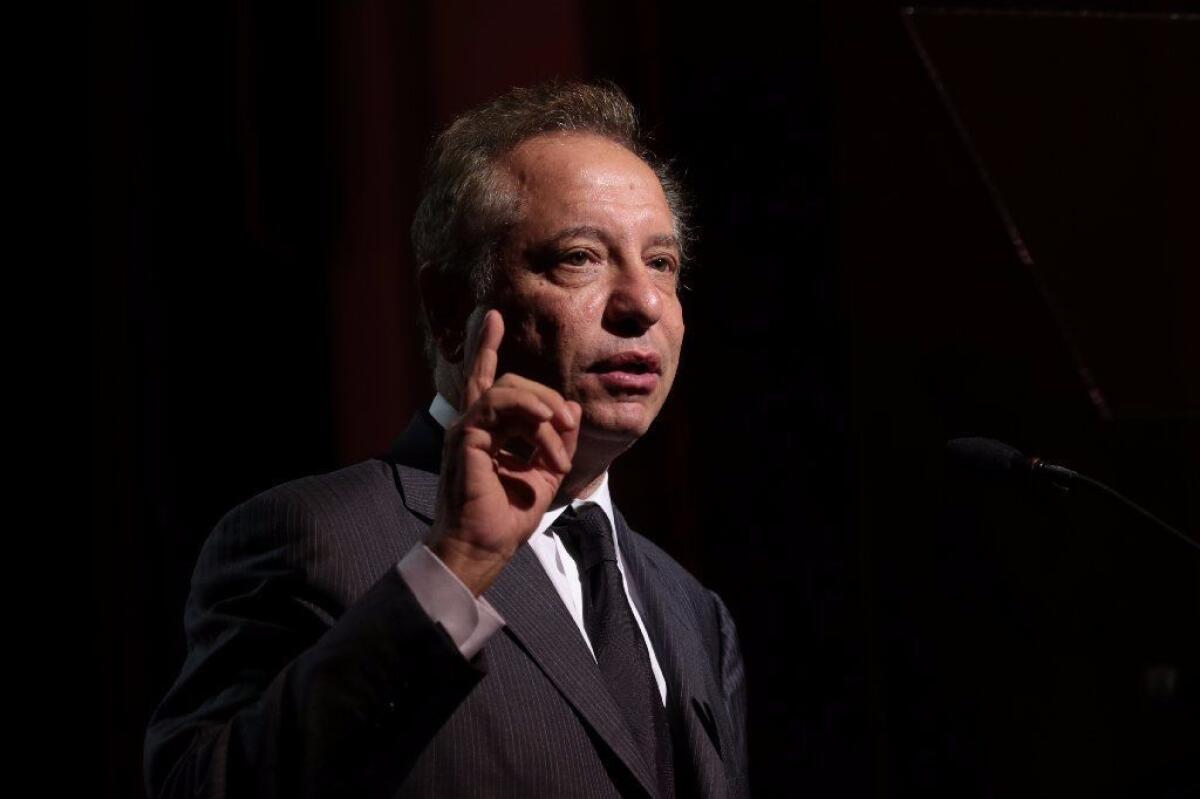USC president tries to quell outrage over drug allegations against former medical school dean
Acknowledging widespread concern on campus, USC President C.L. Max Nikias said Tuesday the university would “examine and address” a report in The Times that its former medical school dean abused drugs and associated with criminals and drug users.
Nikias, speaking about the controversy for the first time in a letter to the campus community, said that “we understand the frustrations expressed about this situation” involving Dr. Carmen A. Puliafito and “we are working to determine how we can best prevent these kinds of circumstances moving forward.”
“Our university categorically condemns the unlawful possession, use, or distribution of drugs,” the president said. “We are concerned about Dr. Puliafito and his family and hope that, if the article’s assertions are true, he receives the help and treatment he may need for a full recovery.”
Puliafito, 66, a renowned eye surgeon, led the Keck School of Medicine for nearly a decade before resigning in 2016. He remained on the Keck faculty and continued to represent the university at public events as recently as Saturday.
On Monday, The Times published a lengthy article reporting that Puliafito, during his tenure as dean, kept company with a circle of criminals and addicts who said he smoked methamphetamine and other drugs with them.
An overdose, a young companion, drug-fueled parties: The secret life of USC med school dean »
The same day, USC said Puliafito was no longer seeing patients and was on leave. Attempts to reach Puliafito were unsuccessful Tuesday.
Asked Tuesday if the university had discussed the Puliafito case with the California State Medical Board, USC said reports by peer review organizations were confidential.
“We can confirm, however, that the California Medical Board is aware of the situation,” USC said in a statement. “They have the sole authority to decide whether and how much to investigate.”
In California, the medical board initiates investigations of doctors after receiving a complaint. According to the board, cases are given higher priority if the complaint concerns physician impairment or poses immediate harm to patients.
Do you have information about USC’s former med school dean? We want to hear from you »
Puliafito resigned his $1.1-million-a-year dean’s post in March 2016, in the middle of the spring term, saying he wanted to explore outside opportunities.
He did not mention that three weeks earlier, a 21-year-old woman had overdosed in his presence in a Pasadena hotel room. The woman was rushed to a hospital, where she recovered. Police found methamphetamine in the hotel room, according to a police report, but made no arrests.
A tip about the episode prompted The Times to investigate. The newspaper interviewed six people who said they partied and used drugs with Puliafito in Pasadena, Huntington Beach and Las Vegas, as well as at USC. They ranged in age from late teens to late thirties. None were USC students.
Members of the group captured their exploits in photos and videos shot in 2015 and 2016.
In one video, a tuxedo-clad Puliafito displays an orange pill on his tongue and says into the camera, “Thought I’d take an ecstasy before the ball.” Then he swallows the pill.
In another, Puliafito uses a butane torch to heat a large glass pipe outfitted for methamphetamine use. He inhales and then unleashes a thick plume of white smoke. Seated next to him on a sofa, a young woman smokes heroin from a piece of heated foil.
USC has declined to say when it first learned of Puliafito’s conduct or how it responded.

A few days after the incident at the Pasadena hotel last year, a witness phoned Nikias’ office and told two employees about what happened, the witness told The Times on condition of anonymity.
Phone records confirm that the witness made a six-minute call to Nikias’ office on March 14, 2016, 10 days after the overdose.
In his letter Tuesday, Nikias said the university was continuing “the path to improve our support system” for people with substance abuse issues.
“Unfortunately, the issue of substance abuse is not uncommon and impacts individuals at all levels of society,” he wrote. “Reports of high-powered executives, doctors, and others with substance abuse issues have become all too common —individuals who function in their workplace but have serious issues affecting their private lives.”
USC officials hired the Harvard-educated Puliafito in 2007 to raise the profile and ranking of the Keck School.
As dean, he oversaw hundreds of medical students and thousands of professors and clinicians. He was also a key fundraiser for USC, bringing in more than $1 billion in donations, by his own estimation.
ALSO
Editorial: USC’s silence on its medical school dean’s double life is deafening
Most private colleges take very few transfers. At USC, about 1,500 get a spot each year
More to Read
Sign up for Essential California
The most important California stories and recommendations in your inbox every morning.
You may occasionally receive promotional content from the Los Angeles Times.












